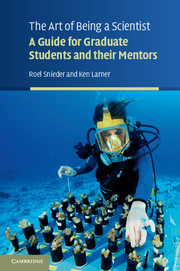Book contents
- Frontmatter
- Contents
- 1 Introduction
- 2 What is science?
- 3 Choices, choices, choices
- 4 The adviser and thesis committee
- 5 Questions drive research
- 6 Giving direction to our work
- 7 Turning challenges into opportunities
- 8 Ethics of research
- 9 Using the scientific literature
- 10 Communication
- 11 Publishing a paper
- 12 Time management
- 13 Writing proposals
- 14 The scientific career
- 15 Applying for a job
- 16 Concluding remarks
- Appendix A Further reading
- Appendix B A sample curriculum
- Appendix C The Refer and BibTeX format
- References
- About the authors
- Index
8 - Ethics of research
Published online by Cambridge University Press: 05 June 2014
- Frontmatter
- Contents
- 1 Introduction
- 2 What is science?
- 3 Choices, choices, choices
- 4 The adviser and thesis committee
- 5 Questions drive research
- 6 Giving direction to our work
- 7 Turning challenges into opportunities
- 8 Ethics of research
- 9 Using the scientific literature
- 10 Communication
- 11 Publishing a paper
- 12 Time management
- 13 Writing proposals
- 14 The scientific career
- 15 Applying for a job
- 16 Concluding remarks
- Appendix A Further reading
- Appendix B A sample curriculum
- Appendix C The Refer and BibTeX format
- References
- About the authors
- Index
Summary
As I embark on my career as a [biomedical] scientist, I willingly pledge that I will represent my scientific profession honorably, that I will conduct my research and my professional life in a manner that is always above reproach, and that I will seek to incorporate the body of ethics and moral principles that constitute scientific integrity into all that I do.
I will strive always to ensure that the results of my research and other scientific activities ultimately benefit humanity and that they cause no harm.
With this affirmation, I pledge to acknowledge and honor the contributions of scientists who have preceded me, to seek truth and the advancement of knowledge in all my work, and to become a worthy role model deserving of respect by those who follow me.
Craig et al., 2003Just as for all activities in life, research has its principles and standards of conduct necessary to ensure that it be carried out in an honest and honorable manner. Such principles and standards, which may collectively constitute or define the “ethics” of an activity, too often are neither objectively nor well defined. This, however, by no means makes them less important than the Federal and State laws that are used in our society to distinguish between behavior that is acceptable and that which is not. In this chapter, we offer a synopsis of what we consider to be the ethics of research, some examples being quite subtle.
- Type
- Chapter
- Information
- The Art of Being a ScientistA Guide for Graduate Students and their Mentors, pp. 110 - 131Publisher: Cambridge University PressPrint publication year: 2009

